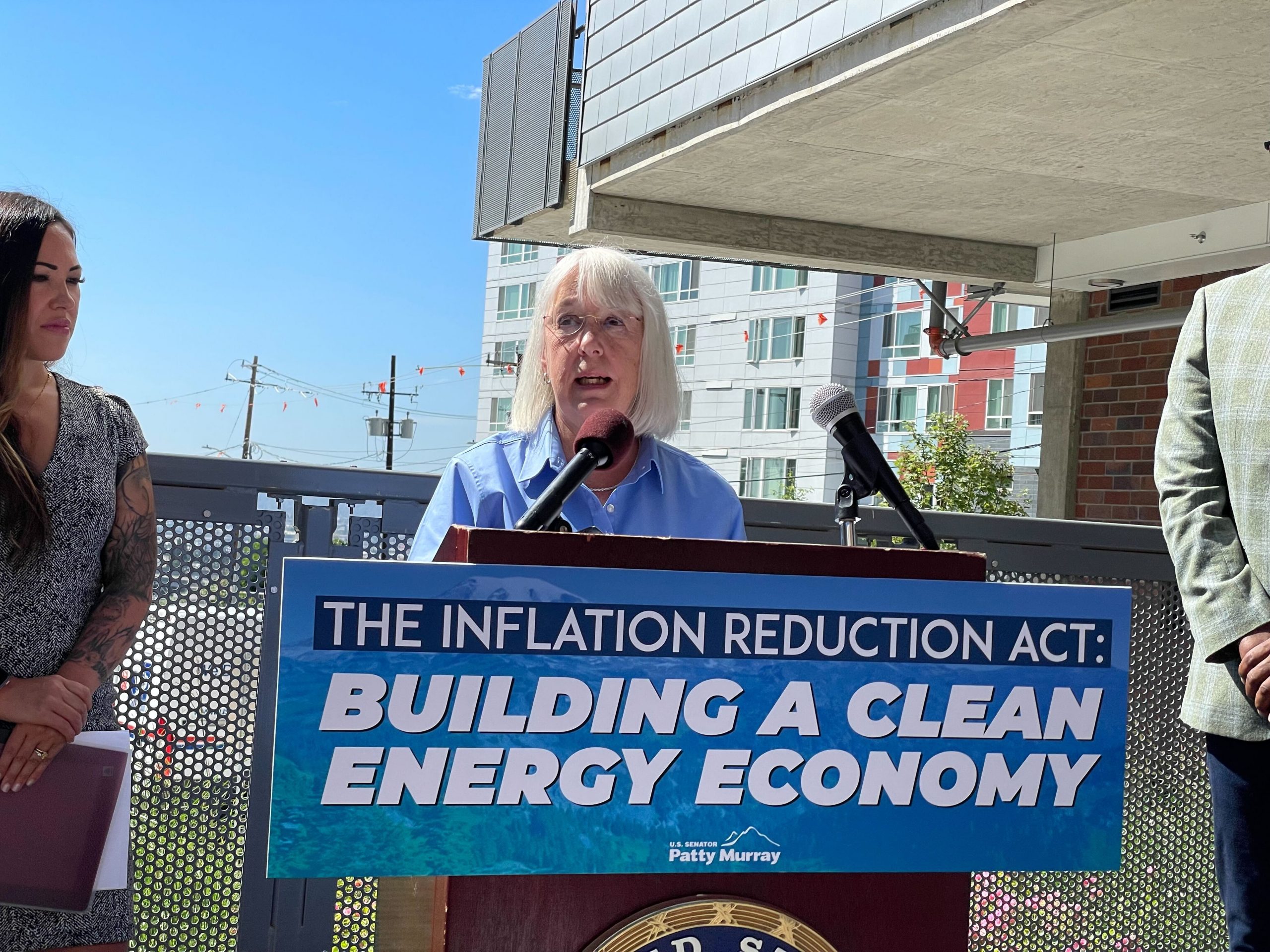ICYMI: Senator Murray Helps Pass Historic Bill to Lower Prescription Drug and Health Care Costs; Tackle Climate Crisis, Build Stronger Clean Energy Economy – MORE HERE
Senator Murray: “The Inflation Reduction Act is going to help supercharge a clean energy economy right here in Washington state while lowering everyday energy costs. This is a huge win for Washington state, where it will help create good-paying jobs and put us on a path to sustainable energy independence.”
***PHOTOS OF THE PRESS CONFERENCE HERE***
***AUDIO OF THE PRESS CONFERENCE HERE***
(Seattle, WA) – Today in Seattle, U.S. Senator Patty Murray (D-WA) hosted a press conference highlighting the landmark climate action investments included in the Inflation Reduction Act she helped pass. The legislation, signed into law today by President Joe Biden, will invest $369 billion over the next decade into clean energy while creating good-paying jobs and lowering everyday energy costs—delivering the largest climate investment in United States history.
Senator Murray held the press conference at Hinoki, a residential building constructed and leased by the Seattle Housing Authority, that includes significant investments in energy saving measures that the Inflation Reduction Act will make more affordable and accessible across Washington state.
On the rooftop at Hinoki a 52-kilowatt solar installation generates renewable energy for Seattle City Light’s renewable energy purchasing program. The metering credits received from Seattle City Light help lower the operating costs of the building. Hinoki is an all-electric building, eliminating the need for natural gas often used for heating and water heating.
Senator Murray was joined by Don Meyer, Commissioner and President at Port of Tacoma; Toshiko Hasegawa, Port of Seattle Commissioner for Pos. 4; and Debra Smith, CEO of Seattle City Light. During the press conference, Senator Murray highlighted noteworthy provisions secured in the legislation to lower energy costs in homes, cut carbon emissions by 40 percent by the end of the decade, and create good-paying clean energy, jobs in every part of Washington state.
“We know that we’re in the thick of the climate crisis – we see it all around us: life-threatening heat waves, road-buckling temperatures last summer, wildfires endangering people’s lives and homes. That’s why I was determined to deliver a landmark investment in climate action,” said Senator Murray. “The Inflation Reduction Act is going to help supercharge a clean energy economy right here in Washington state while lowering everyday energy costs. This is a huge win for Washington state, where it will help create good-paying jobs and put us on a path to sustainable energy independence.”
The Inflation Reduction Act will establish major cost-saving benefits for Washington state consumers with home energy rebates and consumer tax credits to invest in energy efficiency— rooftop solar, heat pumps, appliances, and more. It will also establish $4,000 tax credits for consumers purchasing used clean vehicles and up to $7,500 for new clean vehicles—encouraging manufacturers to put more clean vehicles on the market.
“The investments in the Inflation Reduction Act will help us invest in developing and scaling clean hydrogen technology, and produce cheaper, cleaner infrastructure. That is going to create jobs and deliver important progress in our fight against climate change because this bill is the beginning, not the end of our fight,” said Senator Murray. “Here’s the short and sweet: climate action is good for workers, good for consumers, good for business, and good for our planet—period. With the Inflation Reduction Act, we are delivering lower costs, lower emissions, and a stronger clean energy economy.”
The climate provisions in the Inflation Reduction Act will implement major clean energy tax credits and grants that would spur a historic, first-of-its-kind economy-wide transition to clean energy—from our utilities to manufacturing industry. This will help build on and expand existing solar and wind energy production in Central and Eastern Washington to move us toward sustainable energy independence and takes steps to help rural communities and farmers across Washington state adapt to a rapidly changing climate.
The Inflation Reduction Act will help electrify ports like the Port of Seattle to help cut those emissions and make the air around them safer to breathe. The Inflation Reduction Act also funds research and development into cleaner aviation fuel and technology – much of which happens in Washington state.
The Port of Tacoma and The Northwest Seaport Alliance are actively implementing sustainability initiatives to improve local air quality, meet the global climate challenge, and sustain and strengthen our competitiveness in the cargo shipping industry. The Inflation Reduction Act will provide critical funding to help expedite our transition to zero-emission port operations,” stated Port of Tacoma Commission President and The Northwest Seaport Alliance Co-Chair Don Meyer.
“We applaud the passage of the Inflation Reduction Act and the generational investment in clean air, clean energy and environmental justice. The Port of Seattle and The Northwest Seaport Alliance are eager to put this funding to work to further our zero-emission goals, for the health of our climate, communities, and our industries,” stated Port of Seattle Commissioner and The Northwest Seaport Alliance Managing Member Toshiko Hasegawa.
“Seattle City Light welcomes this landmark climate legislation to incentivize clean energy technologies and provide much needed support for environmental justice communities,” said Debra Smith, general manager of Seattle City Light. “We envision this as a driving force in growth of renewable energy solutions, building energy efficiency and carbon emission reduction.”
The Inflation Reduction Act is fully paid for by ensuring the very wealthiest and giant corporations simply pay their fair share—without raising taxes on any Americans making less than $400,000 per year—and would actually reduce the deficit by more than $300 billion.
A full summary of the climate and energy provisions in the Inflation Reduction Act can be found here.
###


